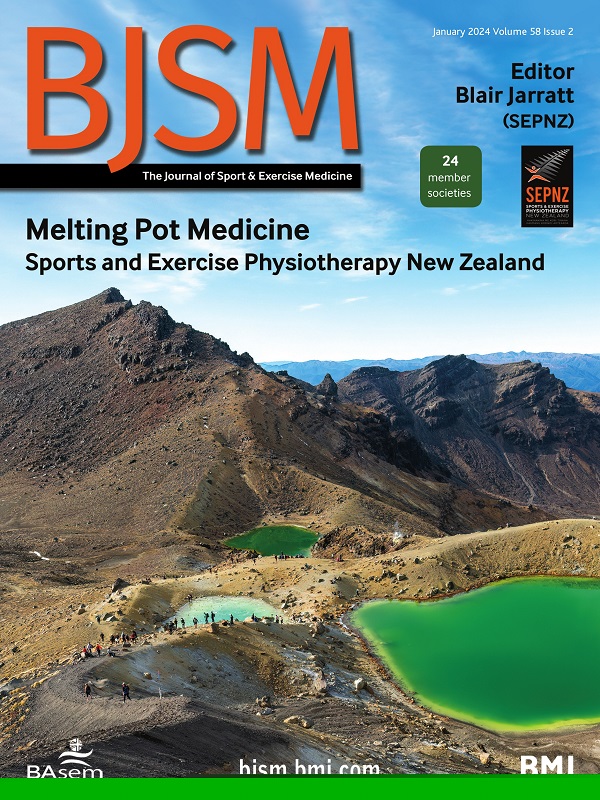国际奥林匹克委员会共识驱动的体育赛事中运动员心理健康支持指南。
IF 16.2
1区 医学
Q1 SPORT SCIENCES
引用次数: 0
摘要
与赛事相关的心理健康问题在优秀运动员中很普遍。然而,缺乏在国际体育赛事中制定和实施综合心理健康支持方案的经验细节。因此,本文旨在提供共识驱动的、基于证据的建议,以指导这种发展和实施。采用基于兰德-加州大学洛杉矶分校适当性方法的8阶段过程来整理和综合有关该主题的现有文献,以确定科学证据中的空白,并从多学科专家小组中获得专家经验来填补这些空白。在这个过程中,研究现有的科学文献,同时咨询专家(包括运动员),就建议达成共识。因此,需要有一个强有力的赛前计划,以确保在体育赛事期间成功实施全面的心理健康方案,重点是促进、预防、治疗和康复。在体育赛事期间,根据确定的赛前计划,针对运动员、教练员、随行人员、官员或球迷实施各种活动:例如,减少耻辱、提高认识和支持寻求帮助的教育方案,减压和放松的心理健身区,由具有特定运动以及创伤和暴力知识技能的合格心理健康专业人员提供的亲自心理健康服务,以及与现有伤害和疾病监测方案并行的心理健康监测。事件发生后,应对已实施的活动进行彻底评价,同时分析监测数据,以确定今后需要有针对性干预的领域。此外,应特别注意事后心理健康支助,包括使用减压干预措施来支持调整、情绪处理和重返社会。本文章由计算机程序翻译,如有差异,请以英文原文为准。
International Olympic Committee consensus-driven guidelines for athlete mental health support at sporting events.
Event-related mental health problems among elite athletes are prevalent. However, empirical details on the development and implementation of a comprehensive mental health support programme at international sporting events are lacking. Therefore, this paper aims to provide consensus-driven, evidence-based recommendations to guide such a development and implementation. An 8-stage process based on the RAND-UCLA Appropriateness Method was adopted to collate and synthesise the available literature on this topic, to identify gaps in the scientific evidence and to enlist expert experience from a multidisciplinary expert panel to fill these gaps. Within such a process, the existing scientific literature was explored while experts (including athletes) were consulted to reach consensus on the recommendations. Accordingly, a robust pre-event plan is required to ensure the successful implementation of a comprehensive mental health programme during sport events, focussing on promotion, prevention, treatment and recovery. During sporting events, according to the defined pre-event plan, various activities targeting athletes, coaches, the entourage, officials or fans should be implemented: for example, educational programmes to decrease stigma, raise awareness and support help-seeking, a mental fitness area for decompression and relaxation, inperson mental health services provided by qualified mental health professionals with sport-specific as well as trauma-informed and violence-informed skills and mental health surveillance in parallel with the existing injury and illness surveillance programmes. Post event, a thorough evaluation of the implemented activities should be conducted while surveillance data should be analysed to identify areas requiring future targeted intervention(s). Also, particular attention should be given to postevent mental health support including the use of decompression interventions to support adjustment, emotional processing and reintegration.
求助全文
通过发布文献求助,成功后即可免费获取论文全文。
去求助
来源期刊
CiteScore
27.10
自引率
4.90%
发文量
217
审稿时长
3-8 weeks
期刊介绍:
The British Journal of Sports Medicine (BJSM) is a dynamic platform that presents groundbreaking research, thought-provoking reviews, and meaningful discussions on sport and exercise medicine. Our focus encompasses various clinically-relevant aspects such as physiotherapy, physical therapy, and rehabilitation. With an aim to foster innovation, education, and knowledge translation, we strive to bridge the gap between research and practical implementation in the field. Our multi-media approach, including web, print, video, and audio resources, along with our active presence on social media, connects a global community of healthcare professionals dedicated to treating active individuals.

 求助内容:
求助内容: 应助结果提醒方式:
应助结果提醒方式:


